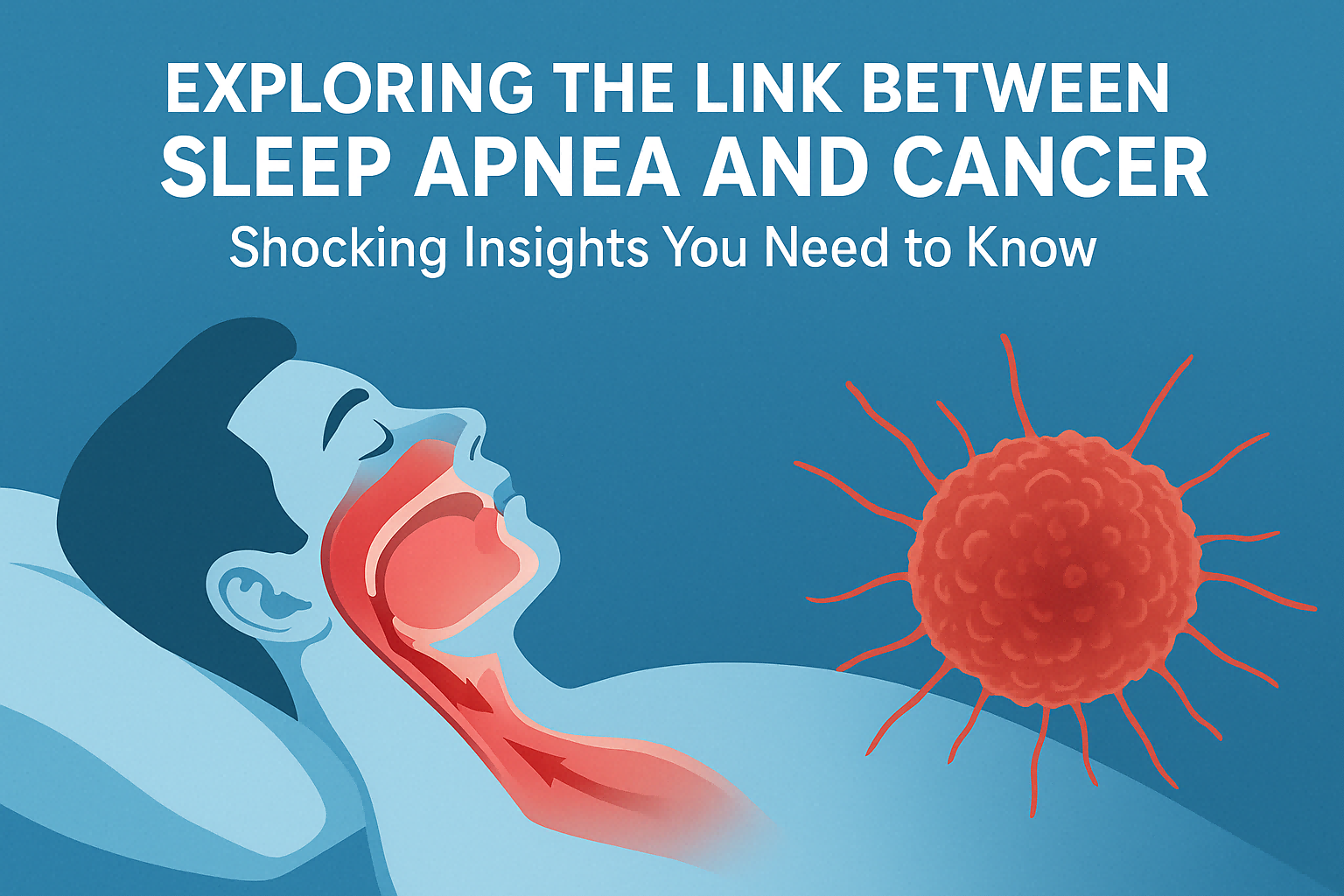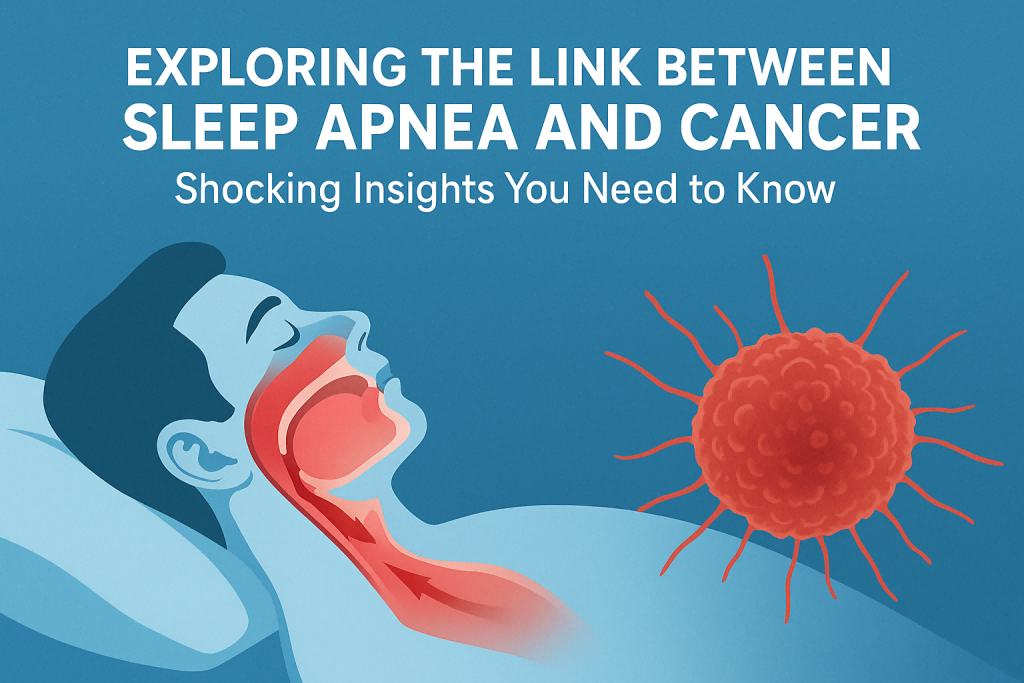Exploring the Link Between Sleep Apnea and Cancer: Shocking Insights You Need to Know


Sleep is one of the most essential functions of human life, yet millions of people worldwide suffer from sleep apnea—a condition that disrupts breathing during sleep. While sleep apnea is commonly linked to heart disease, stroke, and obesity, recent research suggests it may also play a role in the development of cancer.
The possibility that something as common as sleep apnea could influence cancer risk has sparked intense interest among researchers and medical professionals. In this article, we’ll explore the biological connections, scientific studies, treatment strategies, and preventive steps you can take to protect your health.
Understanding Sleep Apnea
What Is Sleep Apnea?
Sleep apnea is a disorder in which breathing repeatedly stops and starts during sleep. These pauses in breathing can last from a few seconds to over a minute and occur multiple times throughout the night.
Types of Sleep Apnea (OSA, CSA, Mixed)
- Obstructive Sleep Apnea (OSA) – the most common type, caused by airway blockage.
- Central Sleep Apnea (CSA) – occurs when the brain fails to send proper signals to breathing muscles.
- Mixed Sleep Apnea – a combination of both OSA and CSA.
Symptoms and Risk Factors
Common symptoms include loud snoring, daytime fatigue, restless sleep, and morning headaches. Risk factors include obesity, smoking, alcohol consumption, and family history.
Understanding Cancer
What Causes Cancer?
Cancer develops when abnormal cells grow uncontrollably, invading healthy tissues and spreading to other parts of the body.
Common Cancer Risk Factors
- Genetics
- Poor diet
- Lack of physical activity
- Chronic inflammation
- Environmental exposures (like radiation or toxins)
The Biological Connection Between Sleep Apnea and Cancer
Role of Intermittent Hypoxia in Tumor Growth
Patients with sleep apnea often experience intermittent hypoxia (low oxygen levels), which may promote tumor growth by stimulating new blood vessel formation.
Impact on Immune System Function
Sleep apnea weakens the immune system, reducing the body’s natural defenses against cancerous cells.
Oxidative Stress and DNA Damage
Repeated oxygen deprivation leads to oxidative stress, damaging DNA and increasing the risk of cell mutations that cause cancer.
Scientific Studies on Sleep Apnea and Cancer Risk
Evidence from Clinical Research
Over the past decade, multiple studies have suggested that people with moderate to severe sleep apnea have a higher risk of developing certain cancers compared to the general population. For example, research from the American Thoracic Society has shown that low nighttime oxygen levels are strongly associated with cancer-related deaths.
Observations in Animal Models
Animal studies have confirmed similar findings, showing that intermittent hypoxia accelerates tumor growth in laboratory mice. This suggests that low oxygen levels from sleep apnea create a microenvironment that favors cancer progression.
Differences in Cancer Types Linked to Sleep Apnea
Some cancers appear to have a stronger link to sleep apnea than others. These include:
- Lung cancer
- Colorectal cancer
- Melanoma (skin cancer)
- Breast cancer
Who Is at Higher Risk?
Age and Gender Factors
Middle-aged and older adults are most commonly diagnosed with sleep apnea. Men are at a higher risk than women, although post-menopausal women also face increased vulnerability.
Lifestyle Choices (Obesity, Smoking, Alcohol)
- Obesity is one of the strongest risk factors for both sleep apnea and cancer.
- Smoking and alcohol use worsen apnea symptoms and contribute to cancer development.
- Sedentary lifestyle further increases the risk of both conditions.
Early Warning Signs and Diagnosis
Recognizing Symptoms of Sleep Apnea
Common red flags include loud snoring, choking or gasping during sleep, morning headaches, and chronic fatigue. If left untreated, these symptoms worsen and increase long-term health risks.
Screening Methods for Sleep Apnea
The gold standard test is polysomnography (overnight sleep study). Portable home sleep tests are also available.
Cancer Screening in High-Risk Patients
Patients diagnosed with severe sleep apnea may benefit from regular cancer screenings, especially if they have additional risk factors like obesity or smoking history.
Treatment and Management Options
CPAP Therapy and Its Impact
Continuous Positive Airway Pressure (CPAP) therapy remains the most effective treatment for sleep apnea. Studies suggest that consistent CPAP use may reduce cancer risks by restoring oxygen levels and reducing systemic inflammation.
Lifestyle Modifications for Prevention
- Maintaining a healthy weight
- Avoiding alcohol and sedatives before bedtime
- Practicing good sleep hygiene
Medical Interventions and Surgical Options
In severe cases, surgeries such as uvulopalatopharyngoplasty (UPPP) or jaw advancement procedures may be recommended to open the airway.
Can Treating Sleep Apnea Lower Cancer Risk?
Evidence from Ongoing Studies
While research is still ongoing, preliminary evidence suggests that early treatment of sleep apnea lowers overall health risks, potentially reducing the chance of developing cancer.
Patient Outcomes and Quality of Life
Patients who adhere to CPAP therapy often report better sleep, improved mood, and higher energy levels—factors that may indirectly improve cancer resilience.
Preventive Strategies for Reducing Both Risks
Sleep Hygiene Practices
- Maintain a consistent bedtime schedule
- Sleep in a dark, quiet room
- Limit screen time before bed
Nutrition and Exercise
Eating a balanced diet rich in antioxidants and engaging in regular exercise can lower risks of both conditions.
Regular Medical Checkups
Routine sleep evaluations and cancer screenings ensure early detection and effective management.
Myths and Misconceptions
“Sleep Apnea Is Just Snoring”
While snoring is a common symptom, sleep apnea involves serious interruptions in breathing, which can be life-threatening.
“Only Older Adults Are at Risk”
Young adults and even children can suffer from sleep apnea, especially if they are overweight.
“Treatment Doesn’t Make a Difference”
Consistent treatment significantly reduces health risks and improves long-term survival rates.
FAQs on Sleep Apnea and Cancer
Q1: Can sleep apnea directly cause cancer?
Not directly. However, the oxygen deprivation and inflammation caused by sleep apnea increase conditions that allow cancer to thrive.
Q2: What cancers are most associated with sleep apnea?
Research suggests stronger links with lung, colorectal, breast cancer, and melanoma.
Q3: How is sleep apnea diagnosed?
Through an overnight sleep study (polysomnography) or a home sleep test.
Q4: Can lifestyle changes reduce both risks?
Yes. Weight loss, exercise, a healthy diet, and quitting smoking lower risks of both sleep apnea and cancer.
Q5: Does CPAP therapy reduce cancer risks?
CPAP therapy restores normal oxygen levels and reduces systemic inflammation, which may help lower cancer risk.
Q6: Who should get screened for sleep apnea?
Anyone experiencing loud snoring, excessive daytime sleepiness, or pauses in breathing during sleep should be evaluated.
Conclusion: Taking Control of Your Health
The evidence linking sleep apnea and cancer is growing, and while more research is needed, one thing is clear: managing sleep apnea is vital for long-term health. By adopting healthy lifestyle choices, seeking early treatment, and undergoing regular screenings, individuals can significantly reduce their risks.
If you suspect you have sleep apnea, don’t wait—consult a sleep specialist and take control of your health today.
🔗 For more details on the latest studies, visit the American Cancer Society.
















